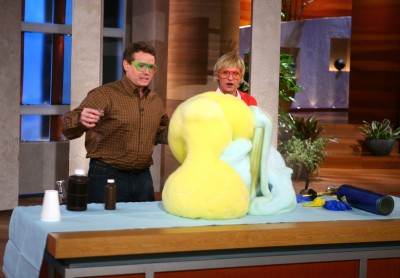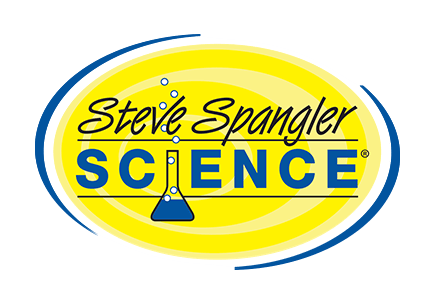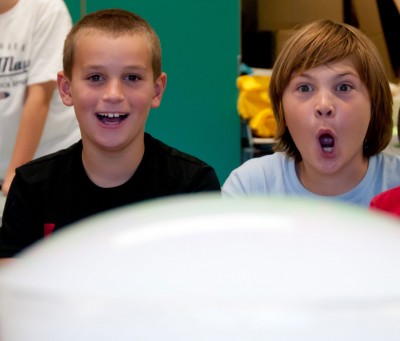Is the Hands-on Approach Really the Best Way to Learn Science?
Our focus at Steve Spangler Science is teaching hands-on science – don’t read just about it in a text book, touch it, see it and live it. That’s where discoveries are made and real learning begins.
Some are challenging that focus on teaching science and pushing for more of a foundation in content before going into the lab. Daniel Willingham (Why Don’t Students Like School?) believes elementary students in particular are novices and are therefore unable to think like a scientist. The only people able to think like scientists are the expert scientists themselves, believes Willingham.
Willingham argues that the only way to become an expert is to have a strong foundation in the field coupled with years of practice and experience. He believes students should write poetry and perform science experiments, but they will not have meaningful and memorable lab experiences until they become a real scientist.
Katherine Beals (Raising a Left-Brain Child in a Right-Brain World) explains that labs are essential for the advancement of science, but questions if they are needed to learn what has already been discovered. In other words, is it better for students to study, hypothesize and question about a specific lab topic and then instead of performing it themselves, read about the experts’ findings? She questions if there is a purpose in re-enacting experiments that have been done over and over. The results have already been discovered, so why have students go through the same motions?
We now teach in a world with science videos, science apps and a plethora of scientific knowledge at our fingertips. There are even programs that will step students through complete labs without the students ever having to touch a pea seed, smell formaldahyde or measure a chemical. Virtual labs calculate the results based on past experiments and give students the data they need while saving money on materials and time spent in the lab.

There are the students out there that will jump up and down about this type of learning. They will step through the exciting parts of the lab without actually having to do it. But what about those who love putting on the lab glasses and gloves and diving into smelly, messy science to watch their results come alive in front of them? Even if a result has been proven again and again, isn’t there something in letting novice students make their own discoveries?
A picture of Elephant’s Toothpaste is cool, but observing it shoot into the air and then smelling the reaction is something you can’t get out of a book.
Science is explosive, olfactory and incredibly visual. It’s also tedious, boring at times, full of research and writing and results don’t always come out as expected. Shouldn’t students of all ages get the opportunity to experience a slice of what the expert scientists live everyday? Just like reading the real Declaration of Independence with the actual signatures of our founding fathers while standing in the National Archives makes a deeper impression than looking at a copy in a book.
What are your thoughts about hands-on vs. building a deeper foundation before reaching for that lab coat? What creates memorable experiences for students?





(I’ve got three kids of my own, a PhD in biology, and I’ve written and edited science education material.)
I think that more experiments in the classroom is absolutely making science more interesting for children! And it’s a way that science can stand out from the other subjects that are more emphasized.
The one big problem I see is *how* those science experiments are used to teach – and to grade.
Science experiments and demonstrations *often* go wrong. Students need to understand that and not get a grade penalty when that happens. Emphasis instead should be on analyzing why it may have gone wrong and understanding what the expected outcome was.
Along those lines, when teachers ask the kids to hypothesize about what will happen in an experiment, the *teacher* needs to have a full understanding that she passes on to the students that there are no wrong answers at this point. It takes a real knack also for a teacher to explain all the wrong answers in a way that makes every student feel good about their guesses – which is *really* important.
Although in general I think trying to predict what’s going to happen is dangerous to science research. In some ways you can’t help doing this, but when you have expectations you have bias introduced into your experiment. Yep, I don’t really like the way the scientific method is taught.
I earned my undergrad degree in science education and my master’s in teaching, so I’m well-versed in this issue. I just wrote about it on my blog on July 30. If you go back to empirical evidence and well-designed research studies in the field of education, there’s absolutely no doubt that students learn concepts better using a constructivist model. In such, they are actively involved in the process of science – questioning, investigating, analyzing, concluding. I do not mean cookie cutter, recipe-like labs here, but actual investigations that they design, based upon their own questions. If you want them to have a real, lasting grasp of the concept, you should let them figure it out for themselves (given a set of materials and intelligently structured setting).
This ideology raises a whole set of objections in the public school setting (not enough content, too much flexibility, classroom management, etc.), but I’m fortunate enough to homeschool my kids.
Absolutely!
With cuts threatening science practicals in schools, a hands-on approach must continue to play a vital role in the provision of high quality Science Education.
I am writing to personally pay tribute to all Science Technicians, the “unsung heroes” of the world of Science. Their enthusiasm, efficiency, and reliability is playing a great part in the success of Science in schools.
Their dedication to supporting the teaching of Science is commendable.
Dr Eric Demoncheaux
Head of Science
Battle Abbey School
Eric